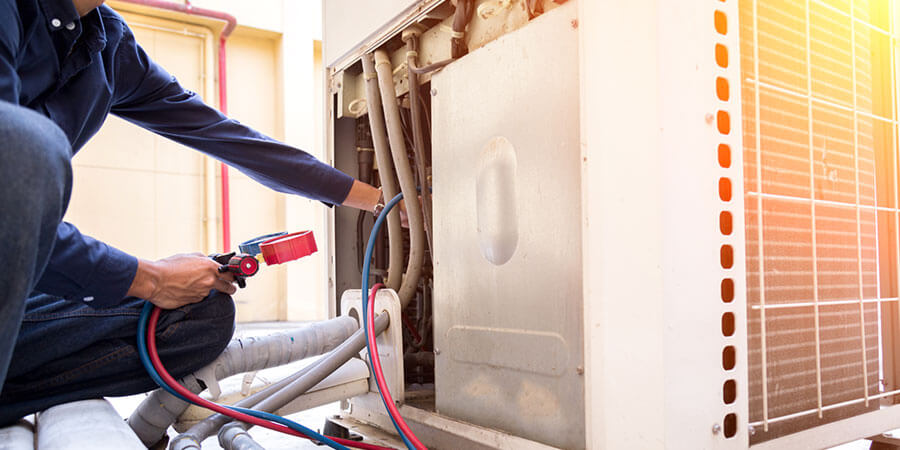Energy-Efficient HVAC Solutions to Minimize Energy Costs
As power prices proceed to increase, the value of energy-efficient cooling and heating systems comes to be increasingly obvious. These systems not only guarantee substantial savings on utility costs yet additionally add to a much more sustainable future by minimizing energy intake. With numerous choices available, consisting of geothermal heat pumps and ductless mini-splits, home proprietors face a multitude of selections that can improve comfort and air quality. Comprehending the essential features and upkeep requirements is crucial to making best use of these benefits. What factors should be focused on when selecting the appropriate system for your requirements?
Advantages of Energy-Efficient Heating And Cooling Equipments
Energy-efficient heating and cooling systems supply various benefits that extend beyond plain cost savings. One substantial benefit is the decreased ecological impact. By taking in much less power, these systems contribute to reduce greenhouse gas exhausts, aiding to fight environment adjustment and promote sustainability. This aligns with boosting social demands for environment-friendly techniques in property and industrial settings.
Additionally, energy-efficient a/c systems often provide enhanced comfort levels. A number of these systems feature sophisticated modern technology that enables for much better temperature level control and enhanced air high quality (DMAKS HVAC). This causes a much healthier indoor atmosphere, which is especially essential for individuals with allergies or respiratory issues
Furthermore, spending in energy-efficient cooling and heating systems can boost residential or commercial property value. As more customers focus on energy efficiency, homes and buildings equipped with these systems might draw in higher bids in the property market.
Kinds Of Energy-Efficient Cooling And Heating Options
Just how can house owners and companies select one of the most ideal energy-efficient a/c choices for their needs? The marketplace uses a range of energy-efficient heating and cooling systems, each designed to boost convenience while reducing energy intake.
One choice is the variable refrigerant circulation (VRF) system, which successfully controls the temperature in several zones within a building. This system adapts its cooling agent circulation to match the desired temperature, resulting in significant energy savings.
An additional popular selection is geothermal warm pumps, which make use of the earth's secure temperature to warmth and great spaces. By moving heat to and from the ground, these systems show impressive effectiveness, particularly in modest climates.
Furthermore, ductless mini-split systems provide an energy-efficient option for homes doing not have ductwork. These systems allow for zone-specific heating & cooling, minimizing power waste in unoccupied locations.
Last but not least, high-efficiency furnaces and a/c, with advanced SEER and AFUE scores, supply reputable environment control while consuming less energy than typical models. By assessing these choices, home owners and companies can choose a cooling and heating system tailored to their certain demands and energy efficiency goals.
Trick Attributes to Take Into Consideration

Following, check out the sort of compressor made use of in the system. DMAKS HVAC. Variable-speed compressors can adjust their result to match the heating or cooling down need, causing improved convenience and energy financial savings compared to single-speed versions. Furthermore, look for systems outfitted with clever thermostats that provide programmable setups and remote gain access to, allowing for far better control over energy intake
One more critical function is the system's air filtration capacity. High-efficiency filters can improve interior air quality and lower energy consumption by making sure the system runs successfully. In addition, consider the sort of refrigerant used; modern systems often employ environment-friendly cooling agents that have a reduced environmental effect.
Last but not least, make certain that the system is suitable with zoning innovation, which permits tailored temperature level control in various locations of your home, enhancing convenience while lessening energy use.
Tips for Picking the Right System


Following, take into consideration power efficiency ratings, specifically the Seasonal Power Effectiveness Ratio (SEER) for cooling down systems and the Annual Fuel Application Performance (AFUE) for furnace. Higher rankings suggest greater performance, which can cause significant recommended you read financial savings on energy bills with time.
Furthermore, assess the kind of a/c system that best matches your way of life and budget. Alternatives include central air, ductless mini-splits, and heatpump, each with its own collection of advantages and disadvantages.
Don't forget the significance of correct setup and DMAKS HVAC sizing; an inaccurately sized system can cause inefficiencies and boosted wear. Lastly, speak with a professional a/c professional to acquire experienced suggestions customized to your home's distinct needs. This detailed strategy will guarantee that you pick an energy-efficient HVAC system that satisfies your demands and budget properly.
Upkeep for Optimal Efficiency
When the appropriate HVAC system is in location, continuous upkeep comes to be key to guaranteeing ideal performance and long life. A well-maintained system operates better, leading to reduced power intake and lowered energy costs. Normal inspections and tune-ups should be scheduled at the very least twice a year-- when before the cooling season and once before the heating season.

Homeowners must also be attentive about checking their HVAC system's performance. Uncommon noises, changing temperature levels, or enhanced power bills can suggest underlying concerns that require prompt interest. By resolving these worries immediately, homeowners can stop expensive fixings and extend the life expectancy of their systems.
Purchasing an upkeep plan with a qualified specialist not only enhances efficiency but likewise offers comfort, recognizing that the system is running at its ideal. DMAKS HVAC. Routine maintenance is therefore crucial for sustaining energy performance and reducing overall operational expenses
Final Thought
To conclude, energy-efficient HVAC systems present a practical service for minimizing energy expenses while improving convenience and air high quality. By including innovative modern technologies and alternatives such as geothermal heatpump and ductless mini-splits, homeowner can accomplish Recommended Reading significant energy savings and add to ecological sustainability. Mindful factor to consider of system attributes and recurring upkeep even more guarantees optimal performance, making energy-efficient systems a sensible financial investment for both economic and environmental benefits.